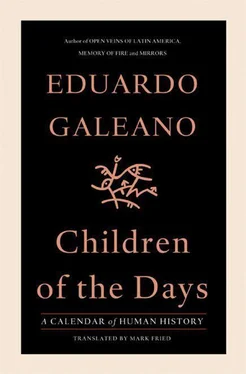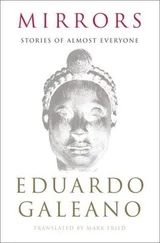The Conservative Party was in power in Nicaragua on this day in 1837 when women won the right to abortion if their lives were in danger.
One hundred seventy years later, in the very same country, legislators who claimed to be Sandinista revolutionaries outlawed abortion “in any circumstance,” and thus condemned poor women to prison or the cemetery.
April 28. THIS INSECURE WORLD
Today, on World Day for Safety and Health at Work, it’s worth noting that these days nothing is as insecure as a job. More and more workers awaken each day wondering: “Am I about to become excess baggage? Who is going to hire me?”
Many lose their jobs and on the job many lose their lives: every fifteen seconds a worker dies, murdered by what they call “workplace accidents.”
Insecurity is the politicians’ preferred topic when they want to unleash the hysteria that wins elections. Danger, danger, they declare, on every corner there’s a thief, a rapist, a murderer. But those politicians never decry the dangers of working,
or the dangers of crossing the street, since every twenty-four seconds a pedestrian is killed, murdered by what they call “traffic accidents”;
or the dangers of eating, since whoever is safe from hunger may well be poisoned by the chemicals in their food;
or the dangers of breathing, since in cities clean air is like silence, a luxury item;
or the dangers of being born, since every three seconds a child dies before reaching the age of five.
April 29. SHE DOESN’T FORGET
Who knows all the shortcuts through Africa’s jungles?
Who knows how to evade the menacing approach of ivory hunters and other wild predators?
Who can read her own tracks and the tracks of all others?
Who preserves the memory of all and sundry?
Who emits signals that humans can neither hear nor decipher?
Signals that frighten or assist or threaten or greet from ten miles distant?
It is she, the elephant elder. The oldest, the wisest. The one who walks at the head of the herd.
April 30. MEMORY’S CIRCLES
This afternoon in 1977, fourteen mothers of disappeared children met for the first time.
From then on they searched as a group, as a group they knocked on doors that would not open. “All for all,” they said.
They said, “All for our children.”
Thousands upon thousands of children had been devoured by the Argentine military dictatorship, and more than five hundred children had been kidnapped and given to officers as war booty. The papers, radio, TV breathed not a word of it.
A few months after their first meeting, three of those mothers, Azucena Villaflor, Esther Ballestrino and María Eugenia Ponce, also disappeared, just like their children, and like them they were tortured and murdered.
But by then the Thursday meetings were unstoppable. Their white kerchiefs moved round and round the Plaza de Mayo and around the world.
May 1. INTERNATIONAL WORKERS’ DAY
The technology of shared flight: the first goose to take off opens the way for the next, who clears the path for the third, and the strength of the third raises the fourth, who then helps the fifth, and the impulse of the fifth pulls along the sixth, who offers wind to the seventh.
When the lead goose tires, he goes to the back of the line and leaves his spot to another, who moves to the apex of the V the geese form in the air. Each takes a turn, forward and back, and none of them believes he is supergoose because he flies first or that flying last makes him a loser.
May 2. OPERATION GERONIMO
Geronimo led the Apache resistance in the nineteenth century.
This chief of the invaded earned himself a nasty reputation for driving the invaders crazy with his bravery and brilliance, and in the century that followed he became the baddest bad guy in the West on screen.
Keeping to that tradition, “Operation Geronimo” was the name chosen by the US government for the execution of Osama bin Laden, who was shot and disappeared on this day in 2011.
But what did Geronimo have to do with bin Laden, the delirious caliph cooked up in the image laboratories of the US military? Was Geronimo even remotely like this professional fearmonger who would announce his intention to eat every child raw whenever a US president needed to justify a new war?
The name was not an innocent choice: the US military always considered the Indian warriors who defended their lands and dignity against foreign conquest to be terrorists.
At the end of 1979, Soviet troops invaded Afghanistan.
The official justification was to defend a secular government trying to modernize the country.
I was a member of an international tribunal in Stockholm that took up the case in 1981.
I will never forget the dramatic climax of those sessions.
A leading religious figure, representing the Islamic fundamentalists known at that time as “freedom fighters” and now called “terrorists,” was giving testimony.
The elderly man screamed, “The Communists have sullied the honor of our daughters! They taught them to read and to write!”
May 4. WHILE THE NIGHT LASTS
In 1937 Noel Rosa died at the age of twenty-six.
A musician of the Rio de Janeiro night, who in his short life saw the beach only in photographs, he wrote and sang sambas in the bars of the city that sings them still.
In one of those bars a friend bumped into him at the nocturnal hour of ten in the morning.
Noel was humming a newborn tune.
On the table stood two bottles. One beer, the other cheap rum.
The friend knew that tuberculosis was killing him. Noel saw the worry in his friend’s face and felt obliged to instruct him in the nutritive properties of beer. Pointing to the bottle he declared, “This is better for you than a good meal.”
The friend, not exactly convinced, pointed at the bottle of rum. “What about that?”
And Noel explained, “How good is a good meal if you don’t have something with it?”
May 5. BY SINGING I REBUKE
In 1932 Noel Rosa recorded his samba “Quem dá mais?” a short history of a country that had been auctioned off:
How much will he earn, that auctioneer
who must be Brazilian as well
selling off in lots of three
all of Brazil, pray tell?
A couple of years later Enrique Santos Discépolo painted a portrait of Argentina’s days of infamy in his tango “Cambalache”:
Today they’re all of a piece
the friend, the damned cheat ,
the dumbbell, the genius, the thief ,
the generous soul, the deadbeat .
Go for it man, get it while you can .
The stock market crash left journalist Jonathan Tilove without a job.
But in 2009, while cleaning out his office in Washington, he saw the Virgin Mary in a coffee stain on his desk, and his luck changed.
As the crisis deepened and everybody lost faith in economists and politicians and journalists, he wasn’t the only one to discover the Virgin in a cheese sandwich or an asparagus plant or a dental X-ray.
In 1954 Vietnamese rebels gave the French army a tremendous beating at their supposedly invulnerable base in Dien Bien Phu. After a century of conquering colonies, glorious France had to exit Vietnam in a hurry.
Читать дальше













